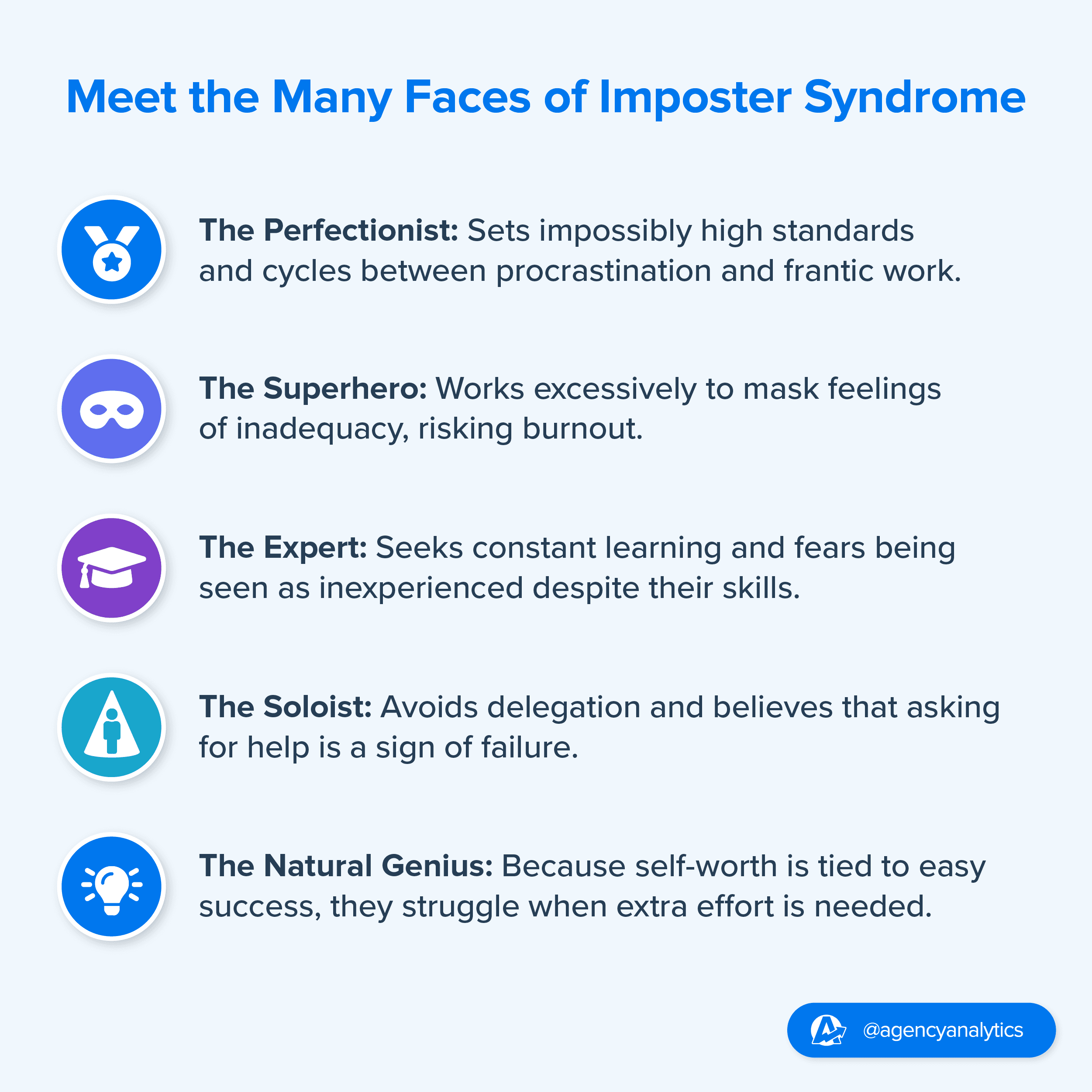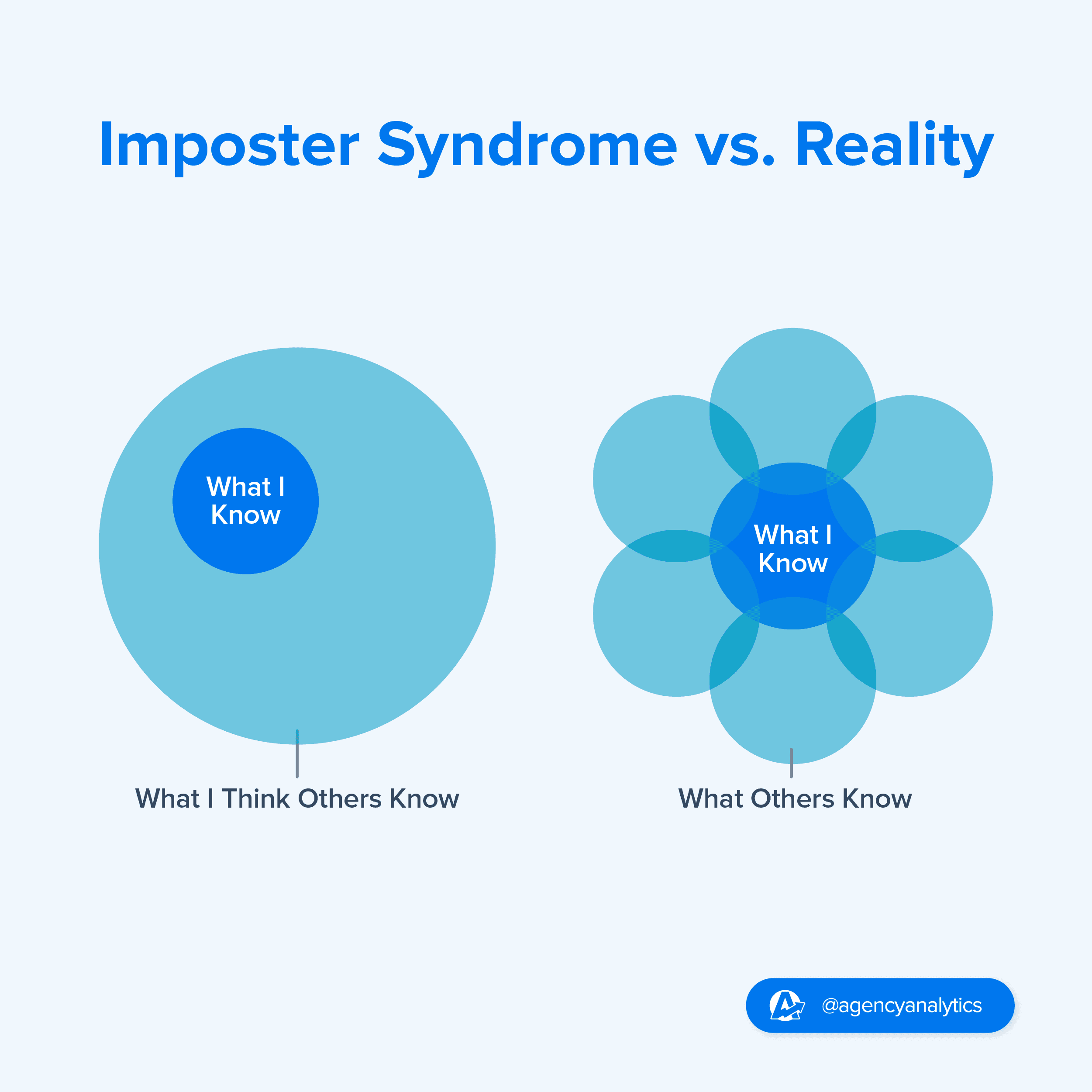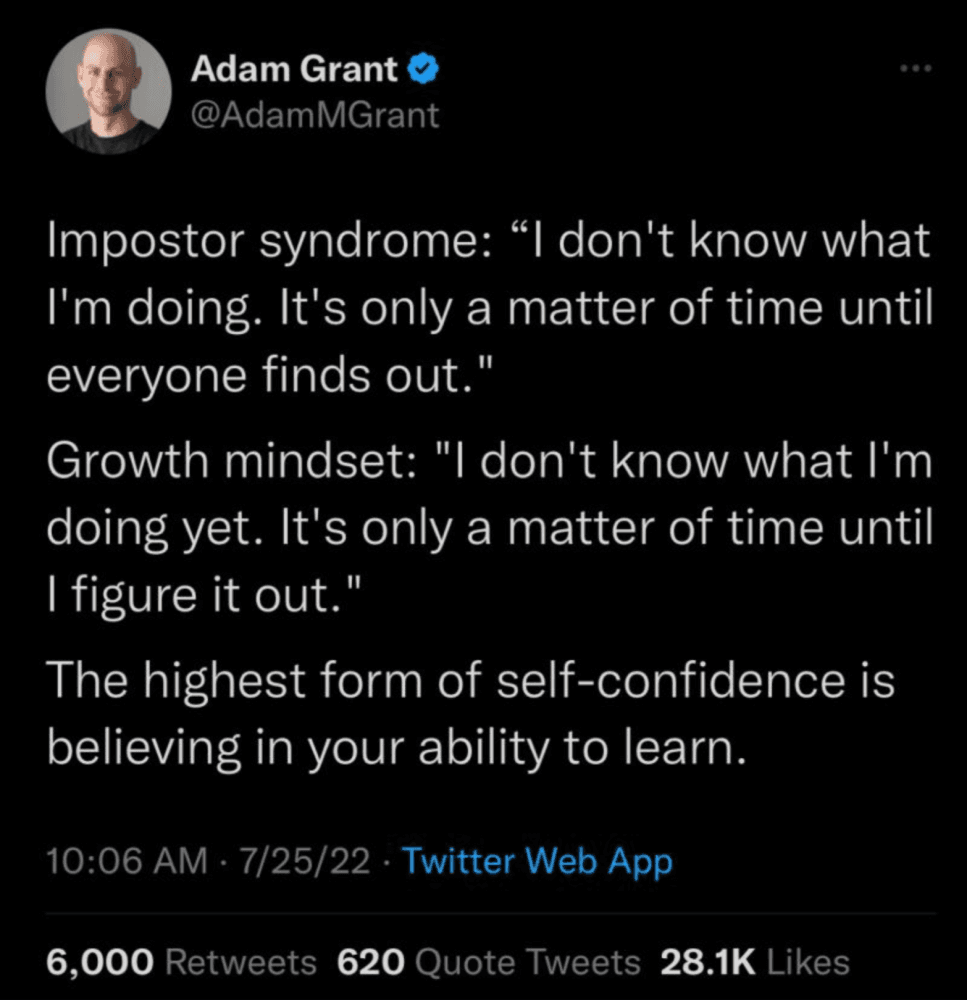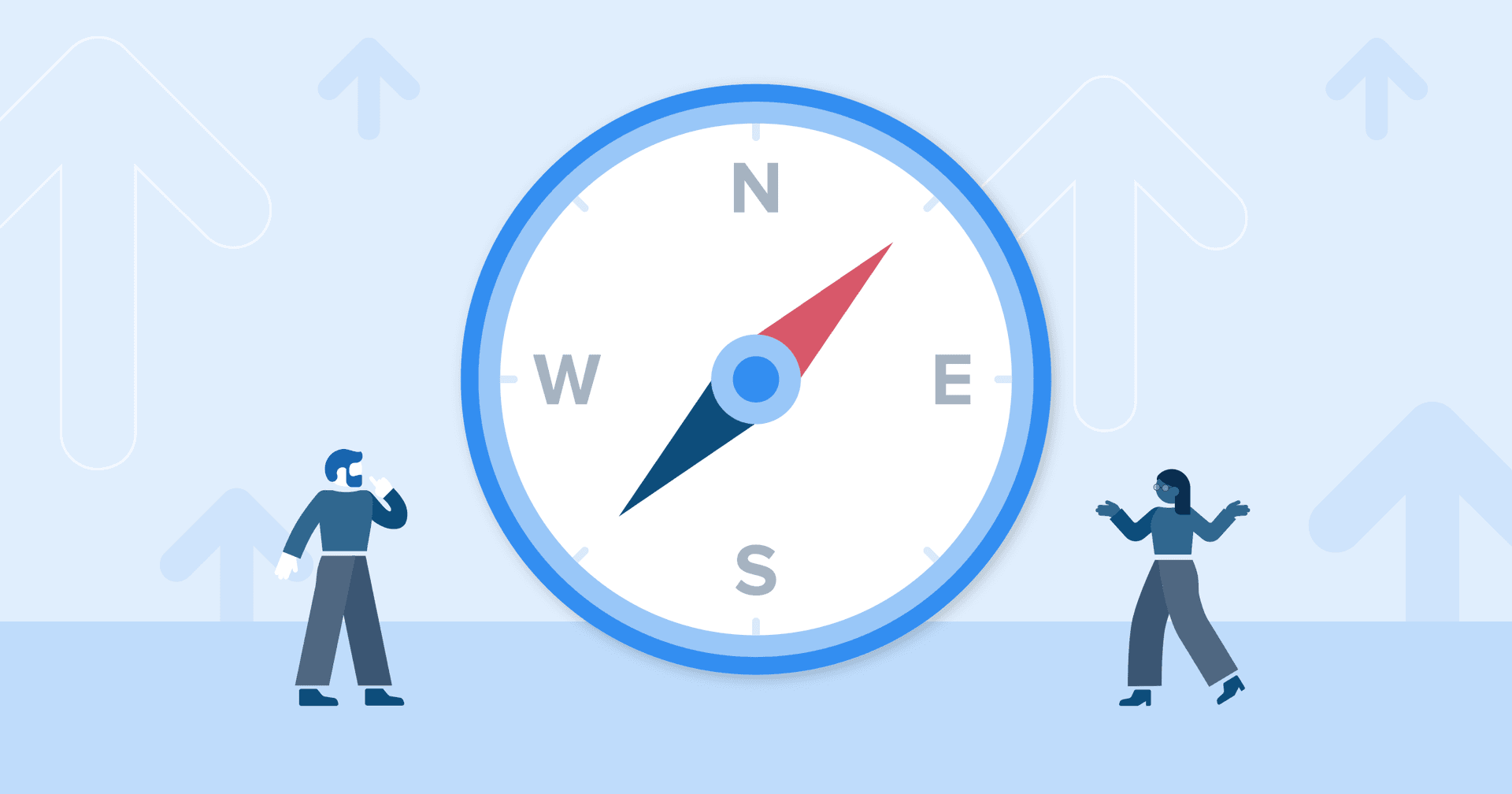Table of Contents
QUICK SUMMARY:
Imposter Syndrome manifests as an internalized fear of exposure as a fraud despite clear accomplishments. It affects many marketing agency leaders regardless of their career success. This article shares effective strategies from leading marketing agency leaders on overcoming Imposter Syndrome while emphasizing growth and confidence.
On the surface, Magan Hurrelbrink is the definition of success.
As Senior Digital Advertising Strategist for marketing agency Word of Mouth, she juggles 20+ concurrent campaigns for clients and handles countless to-dos that go hand-in-hand with working with a team of 10 employees and more than 12,000 followers on social media.
But behind the scenes, a little voice nags her, "Are you actually cut out for this? Do you really know what you’re doing?"
Even though I've been in the industry for many years, have a Master's degree, Google qualifications, Meta qualifications, and many successful campaigns, I still doubt myself when it comes time to press 'publish' on campaigns. The constant worry in my mind that my clients won't get the best results they could, or if I just spend that little bit more fine-tuning the ads, I could do better.
Magan Hurrelbrink, Senior Digital Advertising Strategist, Word of Mouth Agency

Hold the phone: Magan Hurrelbrink gets a call from Imposter Syndrome. (Source: Instagram)
Spoiler alert: that voice in the back of her mind isn't the voice of reason. It's a psychological phenomenon called Imposter Syndrome—and many successful agency leaders admit they regularly question their capabilities and qualifications.
If you’re here, it’s because—like Hurrelbrink and other marketing agency pros—you’ve personally faced Imposter Syndrome, are looking to address it within your team, or are trying your best to stifle it when dealing with clients.
If you're ready to silence that nagging voice in your head, you're in the right place.
And remember: you are not alone.
What Is Imposter Syndrome?
Imposter Syndrome is more than just a buzzword; it's a mental health issue that casts a long shadow over many aspects of our lives and especially our professional journey. It’s a psychological pattern where individuals doubt their skills, abilities, or accomplishments and have a persistent, internalized fear of being exposed as a "fraud."
The term "impostor phenomenon" was coined by psychologists Pauline Rose Clance and Suzanne Imes in 1978. Clance and Imes initially observed the imposter cycle in high-achieving women, but later research found that it affects all genders and various demographics. This led to the Clance Impostor Phenomenon Scale (CIPS), a self-assessment tool developed in the 1980s to measure the intensity of an individual's impostor feelings.
Individuals with imposter syndrome tend to experience feelings of inadequacy and self-doubt, despite evident success, often attributing their achievements to luck or external factors, rather than their own abilities.
Imposter syndrome isn’t an isolated phenomenon, either. In 2020, an extensive analysis of 62 studies assessed how widespread Imposter Syndrome is across various fields. The review found that up to 82% of the population reported symptoms of Imposter Syndrome.
Jessica Tappana knows about Imposter Syndrome all too well.
Tappana is a licensed clinical social worker and therapist specializing in the treatment of Post-Traumatic Stress Disorder (PTSD), anxiety, and Obsessive Compulsive Disorder (OCD). She is also the founder, owner, and CEO of Simplified SEO Consulting, a marketing agency running more than 215 campaigns for private practices, therapists, and small business owners.

As a therapist, Jessica Tappana knows the pitfalls of Imposter Syndrome. (Credit: Simplified SEO Consulting)
Although she has international speaking experience and her work has been featured in dozens of publications—signs that make her a respected figurehead in her field—Imposter Syndrome still leads Tappana to bouts of self-doubt about her qualifications as a marketing agency leader.
My background is not in leadership. My degree is not in leadership. I had a ton of Imposter Syndrome trying to lead this group and trying to figure out, ‘Who am I as a leader? What does that look like? Can I even be a leader?’
Jessica Tappana, Founder, Simplified SEO Consulting
If you've ever felt a lack of self-confidence despite a track record of academic achievement and accomplishments, Tappana welcomes you to the club—a club that no one wants to be a part of but many find themselves in.
Editor’s note: As if from a masterclass in “staying on brand,” the word “Imposter” even has two spellings (Imposter Syndrome and Impostor Syndrome), providing us with yet another opportunity to doubt ourselves as we seek to understand the imposter phenomenon.
5 Different Types of Imposter Syndrome
Imposter Syndrome isn't a one-size-fits-all experience. There are several types, each with its own set of characteristics.
Take perfectionism, for example.
You're most likely a perfectionist if you’ve ever felt like you can’t reach your own impossibly high standards and have found yourself hemming and hawing between bursts of high-octane production.
As the Director of the marketing agency Search Traffic Success, Gerard Goh has seen first-hand how perfectionism affects some of his team members. He also understands that the “perfectionist” is someone at risk of experiencing severe health issues related to Imposter Syndrome.
It's a genuine concern that someone who, despite evident success, doesn't find satisfaction in their work due to perfectionist tendencies may be at risk of experiencing burnout in their professional life. In a way, that will affect their personal life.
Gerard Goh, Director, Search Traffic Success
Although it may be tempting to lump Imposter Syndrome into one big category, that would be like saying every chocolate chip cookie tastes the same.

The Perfectionist: Sets incredibly high standards for themselves and is devastated by anything less than perfection. The all-or-nothing mindset here often leads to a cycle of procrastination followed by hurried, frantic work, culminating in the dreaded feeling of not having "done enough."
The Superhero: Believing they are a fraud, the superhero works harder and longer than those around them to make up for their supposed inadequacies. They often take on too much, burning themselves out in the process.
The Expert: Equating competency to knowledge, these folks constantly seek additional certifications or training because they feel they'll never know "enough." Even with considerable skills and experience, they fear being exposed as inexperienced.
The Soloist: Terrible at delegating, the soloist feels they must accomplish tasks independently. If they need to ask for help, they perceive that as a failure, and feel like a fraud even more.
The Natural Genius: This type is used to skills coming easily and struggles when something takes more effort. Their self-worth is tied to their ease of accomplishment, so having to work hard at something makes them feel ashamed.
The Daily Realities of Imposter Syndrome
Imposter syndrome doesn't clock out at 5 p.m. It's an around-the-clock companion, affecting daily tasks, decision-making, and emotional well-being.
It can infiltrate anyone's mental space, but the stakes are sky-high when you're a busy marketing agency leader like Dan Delmain.
Delmain is the Founder and Owner of the marketing agency that bears his name. :Delmain’s 25 employees handle more than 160 campaigns for dental practices looking to grow their patient base. He is also a frequent contributor to dental publications and podcasts and is the author of From Search to Smile: How to Book More of the Right Patients Through Dental Marketing.

Delmain explains he had the vision to launch his business in his twenties and never looked back, calling it “a blessing and a curse.”
It’s a blessing because the company will go as far as I wish to take it. But a curse because in the numerous roles I've delegated and elevated, I didn't have a previous background serving in that role. So, when I'm leading, managing, and holding people accountable, it's based on my limited knowledge and experience. And sometimes, because of that, I feel like an impostor.
Dan Delmain, Owner, :Delmain
You don't have to be at the pinnacle of your career or a newbie just starting to experience Imposter Syndrome. It can hit anyone, regardless of their level of success, years of experience, or field of work. From CEOs to interns, no one is immune.
Impact on Job Performance, Decision-Making, and Mental Well-Being
The emotional toll from Imposter Syndrome ranges from low self-esteem to social anxiety disorders. On the cognitive front, imposter syndrome distorts the view of skills and achievements.
Jonathan Fashbaugh is the President of Pro Impressions Marketing, a marketing agency with a team of 25 that, like :Delmain’s, builds and runs campaigns for dental practices.

For Jonathan Fashbaugh, fighting Imposter Syndrome means staying true to yourself. (Credit: Pro Impressions Marketing)
For Fashbaugh, feeling like an imposter means losing sight of what has made you a true leader.
To me, imposter syndrome means that you either feel like everyone expects you to know everything, or you've diluted yourself into actually being an imposter, and you're not being authentic to the people around you. I've built a business on transparency and letting clients know I don't have all the answers. I just have the dedication and integrity to do the right thing all the way.
Jonathan Fashbaugh, President, Pro Impressions Marketing
Imposter Syndrome can seriously hinder your performance and decision-making abilities. The constant self-doubt and fear of exposure often lead to procrastination, over-preparation, avoidance of responsibilities, or burnout.
Anatoly Zadorozhnyy, the CEO of Marketing1on1, admits that, at the beginning of running his marketing agency, he used to turn away clients because he thought he wouldn’t be able to deliver the results they desired.
A lack of confidence often leads the person to doubt their abilities and constantly question themselves. Taking time to reflect on my achievements and skills helped me significantly.
Anatoly Zadorozhnyy, CEO, Marketing1on1
Overcoming Imposter Syndrome as a Marketing Agency Leader
Being a marketing agency leader is no walk in the park. Still, it can become incredibly challenging when Imposter Syndrome sneaks into your daily thoughts.
But let's be clear: You've earned your leadership role. The real trick now is to keep that self-doubt at bay.
Take the First Step and Shift Your Mindset
The first step to help you overcome imposter syndrome is admitting it's a problem. Correction: Admitting that you're grappling with imposter syndrome isn't just the first step; it's often the most difficult.
People with imposter syndrome often think, "If I admit to experiencing imposter syndrome, won't that confirm I'm a fraud?" But acknowledging the issue is the antithesis of being a fraud. It's confronting what makes you feel illegitimate, taking away its power over you.
Acknowledging that you have Imposter Syndrome is a brave act of defiance against it. By identifying and labeling it, you externalize the problem, transforming it from an innate character flaw—which it's not—into a challenge to be addressed.
Believe it or not, you’re used to tackling challenges. If you weren’t, you wouldn’t have your current role.
You're an expert for a reason, and even if you don't know the answer, there are so many resources out there to help. Everyone has doubts, but it's the way we react to those thoughts that differentiate us from the pack. Growth only happens from mistakes. How else do you know it's a mistake until it goes wrong?
Magan Hurrelbrink, Senior Digital Advertising Strategist, Word of Mouth Agency
A simple shift in mindset helps ease Imposter Syndrome in a big way. Instead of criticizing yourself for what you haven't achieved, focus on what you have.
Give Yourself the Credit You're Due
It's common for individuals, especially high-achievers, to downplay their knowledge and skills.
The narrative spins a tale of self-doubt, where you might believe everyone else holds vast oceans of knowledge while you're just skimming the surface. But what if that's just an illusion? What if you need to give yourself the credit you rightly deserve?

Much like Fashbaugh, award-winning Fractional Chief Marketing Officer and Forbes NEXT1000 Founder Vix Reitano recommends tracking and celebrating the small wins and watching as they stack up. Before you know it, you'll have a tower of achievements that reinforces you’re precisely where you belong.
Count your wins. Have a ‘Yay Me’ folder in your email and on your desktop to highlight ALL of the wins you have and review it quarterly.
Vix Reitano, Founder, Agency 6B

Vix Reitano believes in the power of positive reinforcement—so celebrate your accomplishments. (Credit: VixReitano.com)
The reality is that you’re likely underestimating your wealth of knowledge. You probably know much more than you give yourself credit for, and it's high time to acknowledge and celebrate that.
Build a Supportive Culture in Your Agency
Make your mental health journey a team effort—and I don’t mean posting that you’re having a relaxing cup of coffee on Instagram.
Create an open culture where you and your team members can discuss your struggles and achievements.
What has helped me deal with imposter syndrome has been honesty and humility. I'm brutally honest with my prior shortcomings. By being genuine and humble about my abilities and my inabilities, people see me coming from a place of vulnerability and not someone I'm pretending to be.
Dan Delmain, Owner, :Delmain
Fostering dialog can be incredibly liberating for everyone involved. Your openness about your experiences with Imposter Syndrome will set the tone for a more empathetic, understanding workplace.
I believe Imposter Syndrome holds people back, specifically those who are just starting out in their careers, and that's a true shame because we need more of those voices now than ever before.
Vix Reitano, Founder, Agency 6B
Admit That You Don’t Have All the Answers
Surprise, surprise, you're human! Admitting that you don’t know everything takes a weight off your shoulders and opens the door for your team to step up.
At the end of the day, I could not come to work and be constantly stressed and have heart attack after heart attack, fooling my clients into believing that I had all the answers. So it's super freeing to just say, ‘No, I'm not going to be that guy.’ If the client only needs someone who says they have all the answers, then they're not a fit for us. And that's how I try to lead the team as well.
Jonathan Fashbaugh, President, Pro Impressions Marketing
Fashbaugh is right: this is not the time to be a lone wolf.
Involve your team in decision-making, seek their opinions, and, most importantly, be open to feedback. It might sting a little, but overcoming Imposter Syndrome is necessary. It makes you more relatable, approachable, and a better leader.
Impress clients and save hours with custom, automated reporting.
Join 7,000+ agencies that create reports in under 30 minutes per client using AgencyAnalytics. Get started for free. No credit card required.
Already have an account?
Log in
Look for Advice or Mentorship To Keep You Accountable
The leadership path sometimes feels isolating, especially when self-doubt creeps in. However, you don't have to navigate this path alone. Seeking advice or mentorship is more than just a lifeline; it's a way to ensure you remain tethered to reality.
Accountability keeps your feet on the ground. Regular check-ins with mentors or accountability partners provide an unbiased view of your performance, helping you stay the course when imposter syndrome tells you to abandon ship.
When needed, provide coaching and training support for your team members to help them know they’re doing their best work.
I strongly believe in tackling things objectively. What helped us was getting external mentors and coaches for our team members in their respective fields. That way, when we assess performance, it’s not just the manager’s opinion. The team can go out with full confidence in their ability to succeed in their role.
Gerard Goh, Director, Search Traffic Success
After all, mentors—especially those in the marketing agency world—have likely faced similar challenges and feelings in their careers. This shared experience offers solace, and knowing you're not alone in your feelings of Imposter Syndrome is comforting.
External perspectives are your reality check when Imposter Syndrome clouds your judgment. A mentor offers seasoned advice, while a group will give you a view of the bigger picture.
Be Mindful of Burnout
The grind doesn't stop, right? Well, maybe it should—at least for a little while. Being constantly “on” will drain you, making you more susceptible to imposter syndrome.
There's this enduring myth in high-stakes fields like digital marketing that whoever sleeps the least and works the most is the MVP. Let's debunk that myth right now. Neglecting self-care and rest doesn't make you a hero; it makes you a ticking time bomb for burnout and a prime candidate for imposter feelings.
Working continuously might give you a sense of false assurance as if the long hours validate your position. But the reality is that running on empty distorts your self-perception and amplifies self-doubt.
Take time to recharge. A well-rested you is a more confident you.
Practical Exercises to Combat Imposter Syndrome
Grounding exercises are effective techniques designed to anchor you to the present moment, particularly when feelings of inadequacy become overwhelming. These exercises create a psychological buffer between you and the spiraling thoughts often associated with imposter syndrome, offering a refreshing mental reset.
Though Imposter Syndrome is not officially classified as a social anxiety disorder, the way people with imposter syndrome feel is often all too similar to panic or anxiety disorders.
Here are some practical grounding exercises tailored for moments when the imposter gremlin starts to chatter:
5-4-3-2-1 Technique: Identify five things you can see around you: four you can touch, three you can hear, two you can smell, and one you can taste. Commonly used for those experiencing a panic attack, this sensory exercise helps divert your attention and bring you back to the present.
Deep Breathing: Focus solely on your breathing. Take a deep breath, hold for a few seconds, and exhale slowly. Repeat several times. This practice calms the mind and reduces stress hormones in the body.
Grounded Feet: Plant your feet firmly on the ground, feeling the floor beneath you. Visualize roots growing from the soles of your feet, anchoring you securely to the earth. Or, as John McClane from Die Hard might do, “make fists with your toes.”
Positive Affirmation: Keep a list of your accomplishments, testimonials, or positive feedback handy. Whenever you doubt your skills or worth, read through them. Sometimes, seeing is believing.
Reality Check: Question the validity of your imposter thoughts. Are they based on facts or just feelings? Challenge them with evidence from your achievements. Remember this mantra: Feelings Aren’t Facts.
Stay Connected: Talk to a trusted colleague or friend about your feelings. More often than not, you'll find that they've experienced similar feelings, and their perspective can be reassuring.
Converse With Your Younger Self: It's often easier to show compassion to a child than our adult selves. Seeing the innocence and potential in your younger self may make it easier to offer words of encouragement and understanding that you resist in your current state.
Remember, these exercises are tools to bring clarity and calm in moments of self-doubt. With consistent practice, they’re instrumental in reducing the grip of imposter syndrome on your psyche.
Confront the Echoes of Doubt To Rise Above Imposter Syndrome
Imposter Syndrome, with its sly whispers and looming shadows, isn’t merely a fleeting sensation; it’s a relentless wave that sometimes threatens to submerge confidence and vision.
Admitting to this vulnerability reflects your commitment, passion, and the depth of your expertise. Those silent moments of questioning aren't signs of inadequacy but echoes of a heart and mind deeply invested in their craft.
As The Marketing Millennials shared on LinkedIn:

For every marketing agency leader who has felt like a mirage in the success landscape, know this: your prowess is real, your journey is valid, and your story deserves the spotlight. Embrace the uncertainties, not as anchors but as compasses steering you towards growth, authenticity, and a deeper understanding of yourself.
After all, a great leader's narrative isn't devoid of challenges—it's defined by how they rise above them.

Written by
Francois Marchand brings more than 20 years of experience in marketing, journalism, content production, and artificial intelligence (AI). His goal is to equip agency leaders with innovative strategies and actionable advice to succeed in digital marketing, SaaS, and ecommerce.
Read more posts by Francois MarchandSee how 7,000+ marketing agencies help clients win
Free 14-day trial. No credit card required.






